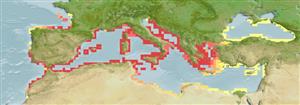>
Blenniiformes (Blennies) >
Blenniidae (Combtooth blennies) > Salariinae
Etymology: Aidablennius: The name could have been after Aida, the title of Verdi's opera which takes place in Egypt (country of the sphinx) (C. Belfiore, pers. comm. 06/18)..
More on author: Valenciennes.
Environment: milieu / climate zone / depth range / distribution range
पारिस्थितिकी
समुद्री ड़िमरसल. Subtropical; 47°N - 20°N, 18°W - 42°E
Eastern Atlantic: Morocco. Also known from the Mediterranean and Black Sea.
आकार / वज़न / Age
Maturity: Lm ? range ? - ? cm
Max length : 8.0 cm TL पुल्लिंग / अलिंग; (Ref. 5981)
Found in very shallow, rocky, littoral zone, exposed to sunlight and surf; on horizontal, algae-covered terraces. Feed on benthic invertebrates and algae (Ref. 5981). Oviparous. Eggs are demersal and adhesive (Ref. 205), and are attached to the substrate via a filamentous, adhesive pad or pedestal (Ref. 94114). Males guard eggs in burrows (Ref. 5981). Larvae are planktonic, often found in shallow, coastal waters (Ref. 94114).
Life cycle and mating behavior
Maturities | पुनरुत्पत्ति | Spawnings | Egg(s) | Fecundities | लार्वा
Oviparous, distinct pairing (Ref. 205). Males guard eggs in burrows (Ref. 5981).
Zander, C.D., 1986. Blenniidae. p. 1096-1112. In P.J.P. Whitehead, M.-L. Bauchot, J.-C. Hureau, J. Nielsen and E. Tortonese (eds.) Fishes of the North-eastern Atlantic and the Mediterranean, volume 3. UNESCO, Paris. (Ref. 5981)
IUCN Red List Status (Ref. 130435)
Threat to humans
Harmless
Human uses
साधन
Special reports
Download XML
इंटरनेट स्रोत
Estimates based on models
Preferred temperature (Ref.
123201): 17 - 19.9, mean 18.8 °C (based on 359 cells).
Phylogenetic diversity index (Ref.
82804): PD
50 = 1.0000 [Uniqueness, from 0.5 = low to 2.0 = high].
Bayesian length-weight: a=0.00741 (0.00335 - 0.01640), b=3.02 (2.83 - 3.21), in cm total length, based on LWR estimates for this (Sub)family-body shape (Ref.
93245).
Trophic level (Ref.
69278): 2.8 ±0.0 se; based on diet studies.
लौटाव (Ref.
120179): ऊंचा, न्यूनतम जनसंख्या दुगनी समय अवलागत 15 महीने। (Preliminary K or Fecundity.).
Fishing Vulnerability (Ref.
59153): Low vulnerability (10 of 100).
